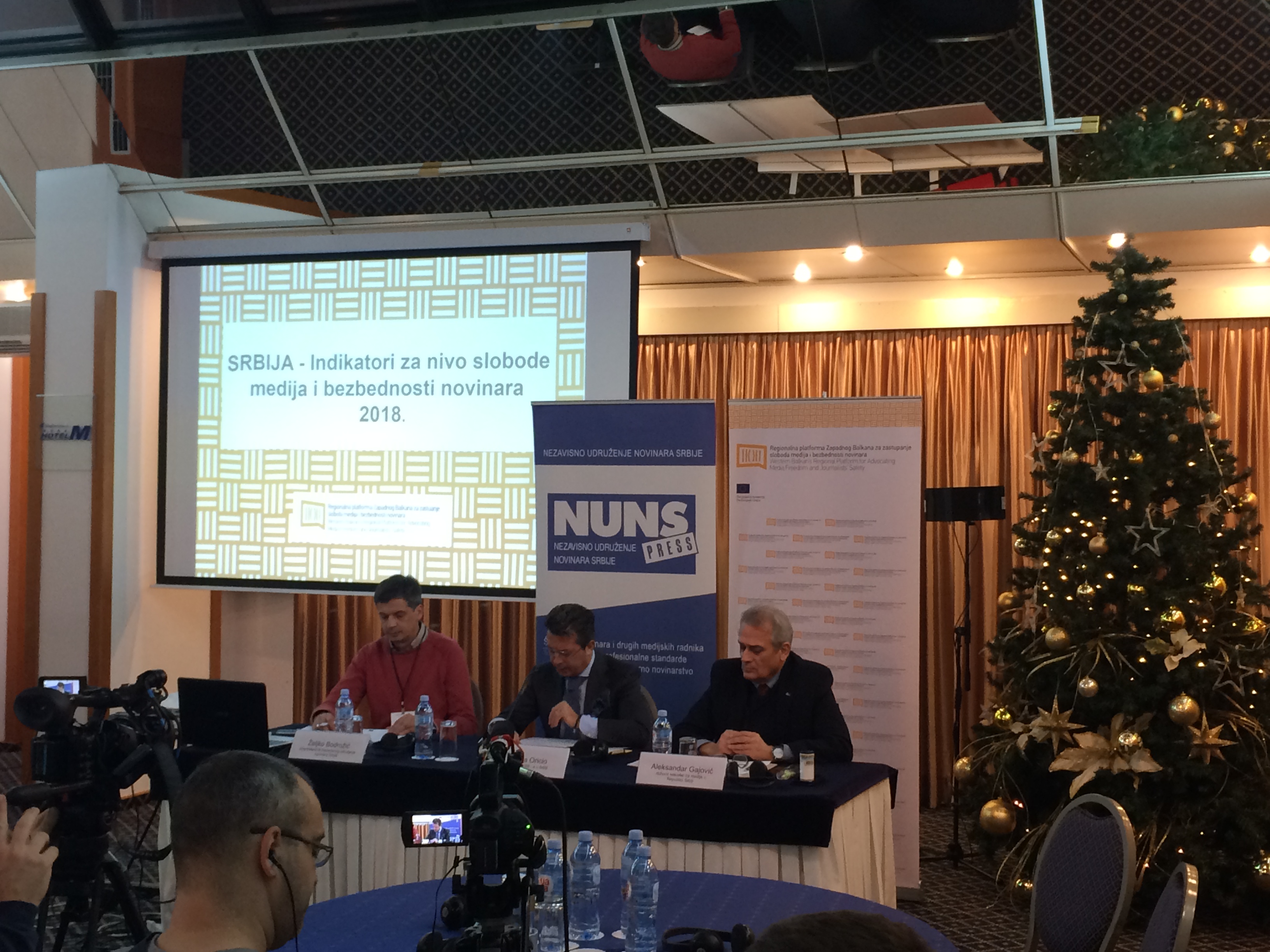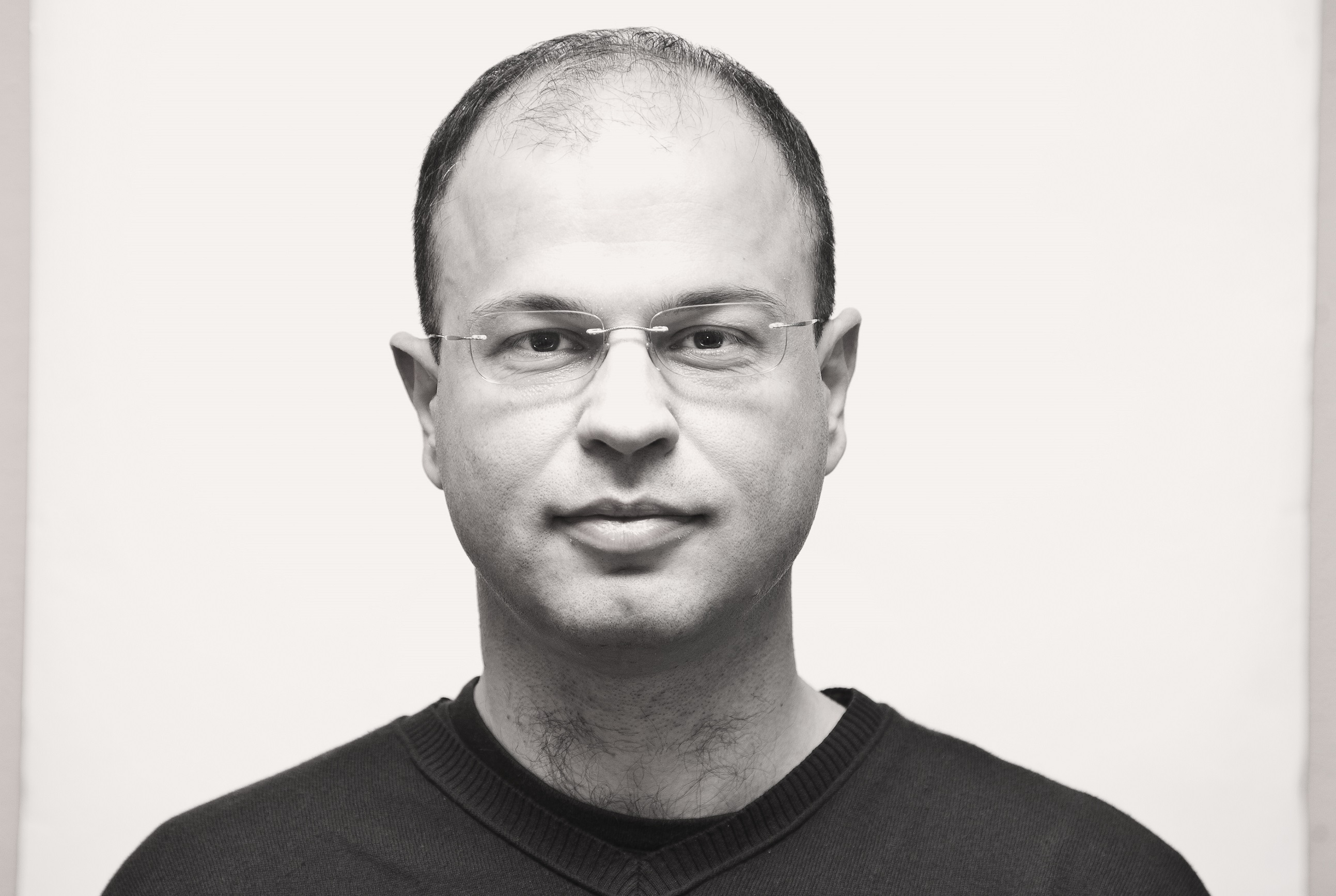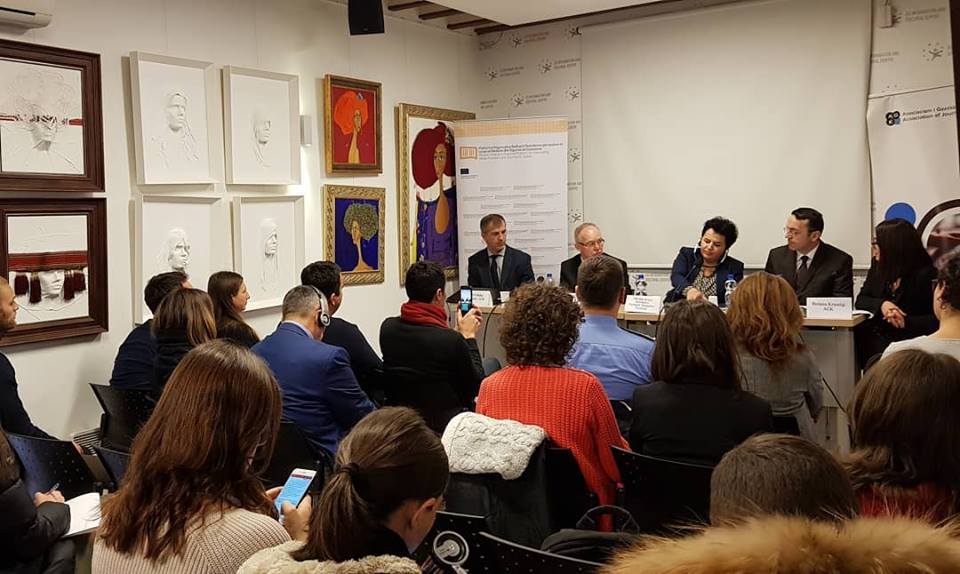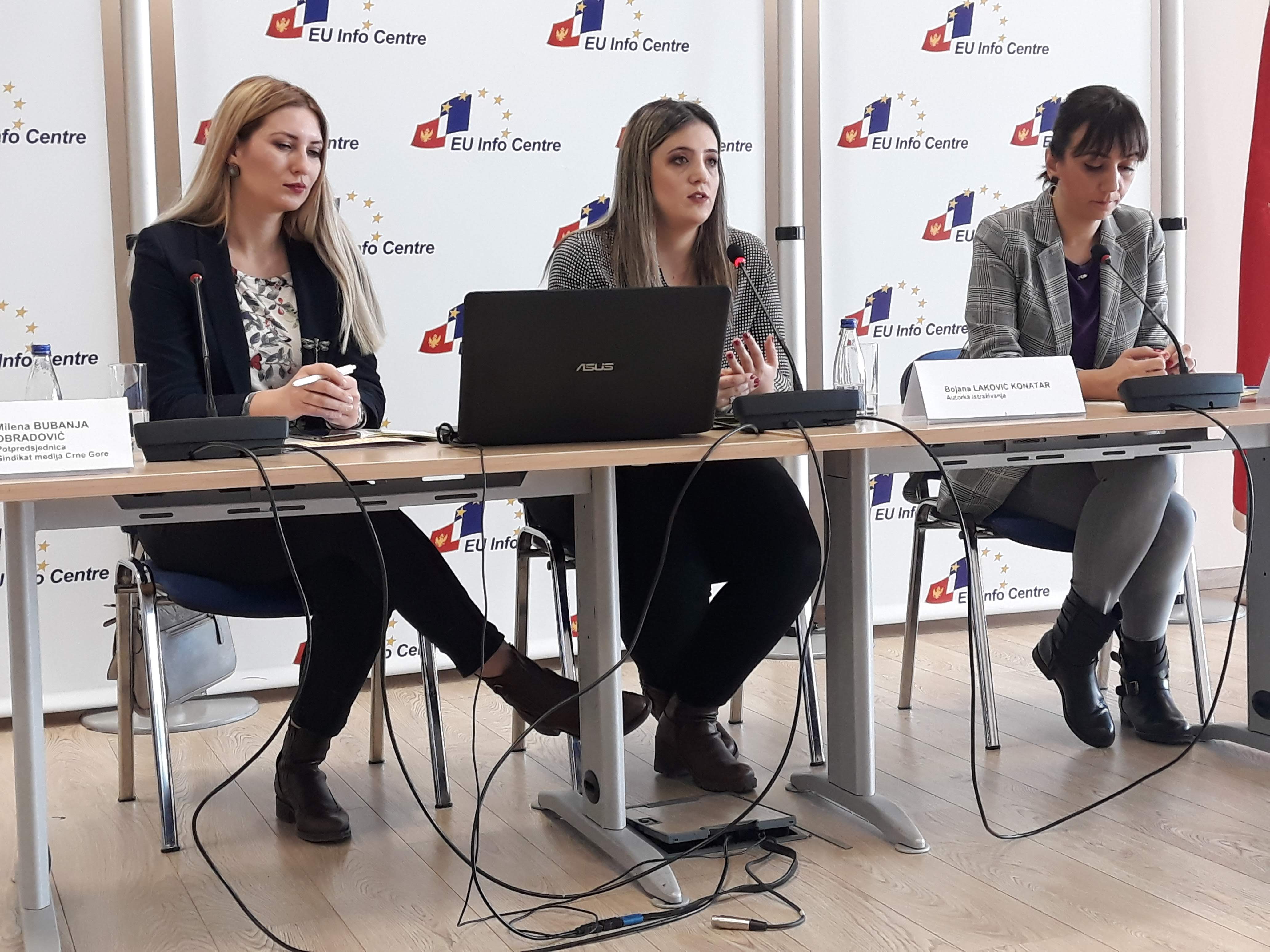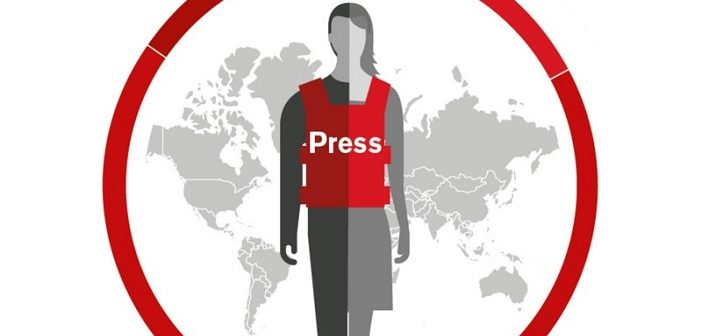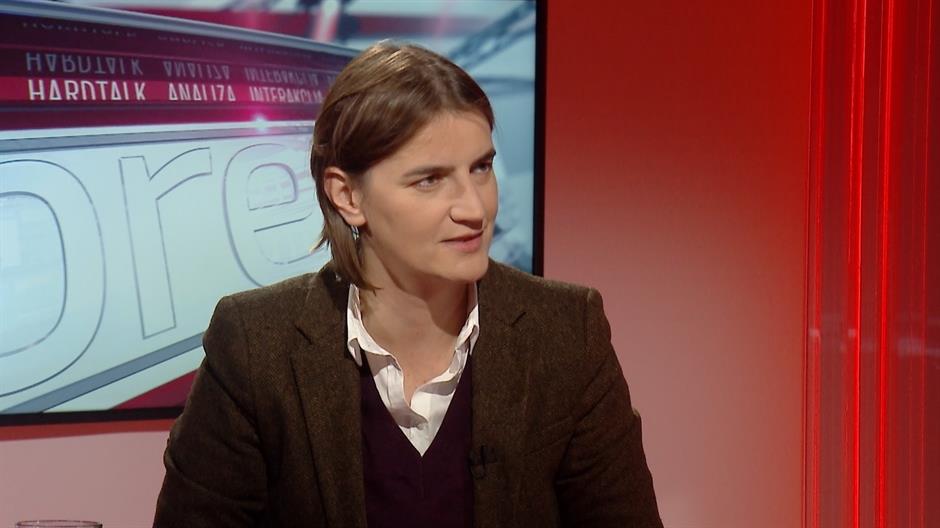BEOGRAD, 20.12.2018. – Sloboda medija u Srbiji je na vrlo niskom niovu i u kontinuiranom je padu poslednjih godina, jedan je od zaključka danas predstavljenog istraživanja Nezavisnog udruženja novinara Srbije (NUNS) u kojem se ocenjuje i da državni zvaničnici ne razumeju ulogu novinara u društvu i da retko i selektivno osudjuju napade na predstavnike medija.
Istraživanje “Indikatori za nivo slobode medija i bezbednosti novinara 2018”, predstavljeno je na skupu u Beogradu kojem je prisustvovao i državni sekretar u Ministarstvu kulture i informisanja Aleksandar Gajović koji je kazao da je bezbednost novinara u Srbiji normativno dobro garantovana Ustavom i medijskim zakonima i da njegovo Ministarstvo osudjuje svaki napad na predstavnike medija.
Autorka istraživanja Marija Vukasović navela je da su od početka godine u NUNS-ovoj bazi zabeležena 93 slučaja napada i pritisaka na novinare, ali da taj broj nije konačan i da rade na još dva slučaja.
Ukazala je i da je od 2016. zabeleženo 70 slučajeva pritisaka i napada na novinare od strane javnih funkcionera i da je najteža situacija na lokalu.
U istraživanju je navedeno da novinari dugo rade u teškim uslovima i da su pod stalnim pritiscima koji više nisu direktni, već da “novinari unapred znaju šta je dozvoljeno pisati, a šta nije”.
Aleksandar Gajović je više puta ponovio da je “prošlo vreme kada se razgovaralo pesnicima” i da se protivi svakoj vrsti upotrebe sile.
On nije odgovorio konkretno na pitanje da li novinari mogu da očekuju više od verbalnih osuda pretnji i napada, a upitan da li će država pomoći novinaru Milanu Jovanoviću kome je nedavno zapaljena kuća u Vrčinu odgovorio je da se u Ministarstvu nije razmišljalo u tom pravcu.
“Nismo razmišljali u tom pravcu, ali to je dobra sugestija, videćemo šta ćemo”, kazao je Gajović.
Prema njegovim rečima, takvi napadi na novinare dokaz su i da su medijski zakoni treba da budu strožiji i da se može razmišljati o njihovim izmenama.
Ocenio je i da svi zajedno treba da se bore za veću bezbednost novinara i dodao da je osnovan vladin Koordinacion tim i Komisija za rešavanje ubistava novinara i da “treba biti strpljiv i da će rezultati doći s verom u istinu”.
Komentarišući podatak da je zabeleženo 70 slučajeva pritisaka i napada na novinare od strane javnih funkcionera, Gajović je kazao da je jednom prilikom od šefice pregovaračkog tima sa EU Tanje Miščević čuo da je zabeleženo 300 napada na novinare, a da je samo sedam ili osam procesuirano.
“I mene je šokirala ta nesrazmera, ali ni policija ni tužilaštvo nisu našli osnov biće kriminala i odbacili su takve prijave. Treba razmišljati i o tome”, kazao je Gajović.
Šef Misije Oebsa u Srbiji Andrea Oricio kazao je da je slučaj paljenja kuće novinara Jovanovića znak za uzbunu i da je to primer na kome se može posmatrati put koji će Srbija da izabere.
On je naveo da novinari u Srbiji “stalno plaćaju visoku cenu”, da nisu rešena ubistva novinara još iz 90-tih godina, a da zločini protiv predstavnika medija “ne smeju da ostanu nekažnjeni”.
“Političari i svi drugi subjekti ne smeju da zastrašuju novinare i moraju u svakom trenutku da osudjuju nasilje, to je veoma važno za jedan otvoreni dijalog”, rekao je Oricio.
Pohvalio je što se radi na izradi nove medijske strategije i naglasio da je veoma važno da u proces njene izrade budu uključena sva relevatna novinarska udruženja, jer prema njegovim rečima strategija “nije totem, već alat” za bolje medijsko okruženje.
“Čini se da vlast deluje hitrije, postoji napredak, ali ima još dosta posla. Moramo ovaj proces da učinimo nepovratnim i dodjemo do konkretnih rezultata”, rekao je Oricio.
Zamenik predsednika NUNS-a i urednik Kikindskih Željko Bodrožić kazao da je niska sloboda medija posledica uticaja vlasti na medije i uredjivačku politiku”, zbog čega je neophodno unaprediti saradnju sa institucijama vlasti.
Dodao je i da projektno sufinansiranje medija treba unaprediti, kako bi ono bilo jasno, odgovorno i transparentno, kao i da su neophodne izmene Zakona o elektronskim medijima kako bi se povećala odgovornost Regulatornog tela za elektronske medije (REM) i mogućio veći uticaj civilnog društva u njegovom radu.
Celokupno istraživanje NUNS-a biće objavljeno na srpskom i engleskom jeziku na sajtu safejournalists.net.


